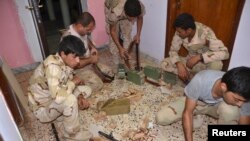The United States and U.N. Security Council Monday denounced the persecution of Iraqi minorities under the control of radical Sunni militants of the Islamic State of Iraq and the Levant (ISIL), which seeks to create a caliphate across parts of Iraq and Syria. The condemnations followed the issuance of a decree by ISIL that Christians and other non-Muslims under its control must convert to Islam, pay a special tax, leave or face execution.
Denouncing ISIL
U.S. State Department spokeswoman Marie Harf Monday denounced ISIL’s declaration Saturday, which impacted Christians, as well as Shi’ite Muslims, Yazidis (Kurds linked to Zoroastrianism) and Shabaks. Many have fled the northern Iraqi city of Mosul and surrounding towns.
"We condemn in the strongest terms the systematic persecution of ethnic and religious minorities by ISIL. We are particularly outraged by ISIL’s recent announcement that Christians in Mosul must convert, pay a tax, leave or face execution in coming days. These are abominable acts," said Harf. "We are very clear that they only further demonstrate ISIL’s mission to divide and destroy Iraq, and they have absolutely no place in the future of Iraq. We could not be clearer."
Late Monday, the U.N. Security Council issued a unanimous declaration denouncing what it calls “the systematic persecution of individuals from minority populations” and those who refuse the “extremist ideology” of ISIL and associated armed groups. The Council said such attacks “may constitute a crime against humanity, for which those responsible must be held accountable.”
The Organization of Islamic Cooperation (OIC) Monday also condemned ISIL for what it calls the “forced deportation” of Christians under the threat of execution, “thus further tearing apart the social fabric of the Iraqi people.” OIC Secretary-General Iyad Ameen Madani condemned what he called “the terrorist group” and said such atrocities contradict the principles of the OIC “that call for the entrenchment of a culture of tolerance and affinity among all nations and peoples.”
Tens of thousands flee
Hundreds of Christian families left Mosul, where they once numbered in the tens of thousands and traced their presence back 1400 years. The group Open Doors, which monitors the persecution of Christians, said, while some families chose to stay and pay the tax, those who fled were sometimes stopped at checkpoints by militants and had their money, jewelry, mobile phones and medicine confiscated.
According to Patriarch Louis Sako, a senior Christian cleric in Iraq, many Christians from Mosul are fleeing to the autonomous region of Kurdistan.
Greg Barton, of the Center for Islam and the Modern World at Australia’s Monash University, said those Christians who remain under ISIL control will be vulnerable. "We’ve seen creeping persecution of Christians across the Middle East by hardline bullies with governments not doing enough to stand up and face it, and now this has reached a peak in ISIL’s caliphate," he stated.
Barton said, while the international condemnation will have no impact on ISIL, it may serve other purposes.
"It will help those voices in Baghdad calling for a new Iraqi government to take a more principled position and it should make it easier for Christians fleeing Mosul and other towns in the north to find sanctuary in Baghdad, but, unfortunately, the last decade has seen a lot of persecution in Baghdad, so one can imagine that a lot will flee the country, if they can," he added.
Barton said it will be up to ISIL leadership to decide whether to chart a less radical course over the territory and people it now controls. He said that could help it consolidate support among more moderate Sunnis. Otherwise, he said, a harsher form of Sharia law could turn the populace against it.




